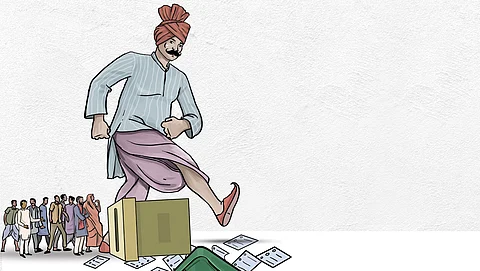

On September 27, 2023, Ukarda village in Gujarat’s Banaskantha district celebrated. The village used to be a part of the adjacent Hasanpura village panchayat but the state government had elevated its status to have a panchayat of its own—a decision the residents had long waited to be able to vote and have a local self-government—the lowest administrative unit in India’s three-tier governance structure. Soon, elections for the positions of sarpanch—head of village panchayat, and nine panchayat members (panch) were declared. However, the state government also simultaneously initiated efforts to implement its Samras Gram Yojana, under which the village panchayat gets a financial incentive if it chooses its representatives through consensus and not by ballot. On June 25, 2025, Pushpa Ben became Ukarda’s unanimously elected sarpanch. The nine members of the panchayat were also elected by consensus. The village did not see campaigning, solicitations for votes through electoral promises or casting of votes. On July 4, Gujarat Chief Minister Bhupendra Patel honoured Pushpa Ben along with other “Samras” panchayat heads, as has been the practice, to encourage this alternative panchayat election route. The same day the government also transferred R3 lakh to Ukarda panchayat’s account—the monetary incentive under the Samras scheme. When Down To Earth (DTE) met Pushpa Ben, she had her head and face covered under the veil of her sari and did not talk. Her husband spoke on her behalf, “The incentive money will be used to fix the water problem of our village.”
Elections to the Vadvasa panchayat in Sabarkantha district were held along with Ukarda. Though a few village residents made efforts to form a Samras panchayat at Vadvasa as well, Satyasha Jagdishchandra Leuva, a 25-year-old lawyer and social worker, did not listen to them or her family members. She filed nomination for the position of sarpanch and forced an election. Leuva won by 104 votes. “Young voters supported me,” she says. “I have won the election, but the mental torture continues. Elders taunt me by asking me how would I arrange the money needed for developmental works,” Leuva adds.
The above two scenarios from Gujarat—the first state in India to have panchayat elections by consensus—show the role of financial incentives in encouraging villages to forego ballot.
In 2001, Prime Minister Narendra Modi, then the chief minister of Gujarat, launched the idea of consensus-based panchayats through Samras Gram Yojana with an evocative slogan: “No debate, no dispute, take decisions through dialogue.” Since then, the state has seen six panchayat elections, where hundreds of villages opted for this route. Gujarat’s Department of Rural Development and Panchayats has worked to expand the initiative across the state over the years.
Under the Samras scheme, a panchayat that opts for the consensus mode receives incentive development funds ranging from R3 lakh to R16 lakh depending on the village population and the number of five-year terms for which it has adopted the mode continuously. This one-time grant is in addition to the …
This article is part of the cover story Forged consensus originally published in the August 16-31, 2025 print edition of Down To Earth